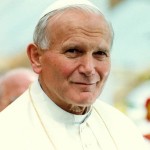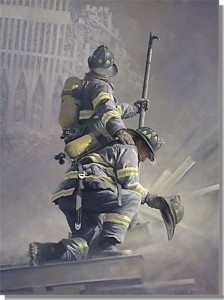 St. Matthew, one of the twelve Apostles, is the author of the first Gospel.Son of Alphaeus, he lived at Capenaum on Lake Genesareth. He was a Roman tax collector, a position equated with collaboration with the enemy by those from whom he collected taxes. Jesus’ contemporaries were surprised to see the Christ with a traitor, but Jesus explained that he had come “not to call the just, but sinners.†Matthew’s Gospel is given pride of place in the canon of the New Testament, and was written to convince Jewish readers that their anticipated Messiah had come in the person of Jesus. He preached among the Jews for 15 years; his audiences may have included the Jewish enclave in Ethiopia, and places in the East.
St. Matthew, one of the twelve Apostles, is the author of the first Gospel.Son of Alphaeus, he lived at Capenaum on Lake Genesareth. He was a Roman tax collector, a position equated with collaboration with the enemy by those from whom he collected taxes. Jesus’ contemporaries were surprised to see the Christ with a traitor, but Jesus explained that he had come “not to call the just, but sinners.†Matthew’s Gospel is given pride of place in the canon of the New Testament, and was written to convince Jewish readers that their anticipated Messiah had come in the person of Jesus. He preached among the Jews for 15 years; his audiences may have included the Jewish enclave in Ethiopia, and places in the East.
 Listen to none other than Mark Hart the Bible Geek about the great work of St. Matthew…of course, the Gospel according to St. Matthew[powerpress]
Listen to none other than Mark Hart the Bible Geek about the great work of St. Matthew…of course, the Gospel according to St. Matthew[powerpress]
Personal note, my favorite Matthew passage (from Chapter 25): “When the Son of Man comes in his glory, and all the angels with him, he will sit upon his glorious throne, and all the nations will be assembled before him. And he will separate them one from another, as a shepherd separates the sheep from the goats. He will place the sheep on his right and the goats on his left. Then the king will say to those on his right, ‘Come, you who are blessed by my Father. Inherit the kingdom prepared for you from the foundation of the world. For I was hungry and you gave me food, I was thirsty and you gave me drink, a stranger and you welcomed me, naked and you clothed me, ill and you cared for me, in prison and you visited me.‘ Then the righteous will answer him and say, ‘Lord, when did we see you hungry and feed you, or thirsty and give you drink? When did we see you a stranger and welcome you, or naked and clothe you? When did we see you ill or in prison, and visit you?’ And the king will say to them in reply, ‘Amen, I say to you, whatever you did for one of these least brothers of mine, you did for me.’ Then he will say to those on his left, ‘Depart from me, you accursed, into the eternal fire prepared for the devil and his angels. For I was hungry and you gave me no food, I was thirsty and you gave me no drink, a stranger and you gave me no welcome, naked and you gave me no clothing, ill and in prison, and you did not care for me.’ Then they will answer and say, ‘Lord, when did we see you hungry or thirsty or a stranger or naked or ill or in prison, and not minister to your needs?’ He will answer them, ‘Amen, I say to you, what you did not do for one of these least ones, you did not do for me.’ And these will go off to eternal punishment, but the righteous to eternal life.”
Tags: apostle, catholic, catholic podcast, catholic prayer, cathollc spirituality, gospel of matthew, levi, martyr, st matthew, tax collectors
This entry was posted on Wednesday, September 21st, 2011 at 12:23 am
You can follow any responses to this entry through the RSS 2.0 feed.
an excerpt from Pope John Paul II’s homily….
 MASS FOR THE CANONIZATION OF KOREAN MARTYRS
Youido Place – Seoul
Sunday, 6 May 1984“Was it not necessary that the Christ should suffer these things and enter into his glory“? (Luc. 24, 26)
3. The truth about Jesus Christ also reached Korean soil. It came by means of books brought from China. And in a most marvellous way, divine grace soon moved your scholarly ancestors first to an intellectual quest for the truth of God’s word and then to a living faith in the Risen
Savior.
Yearning for an ever greater share in the Christian faith, your ancestors sent one of their own in 1784 to Peking, where he was baptized. From this good seed was born the first Christian community in Korea, a community unique in the history of the Church by reason of the fact that it was founded entirely by lay people. This fledgling Church, so young and yet so strong in faith, withstood wave after wave of fierce persecution. Thus, in less than a century, it could already boast of some ten thousand martyrs. The years 1791, 1801, 1827, 1839, 1846 and 1866 are forever signed with the holy blood of your Martyrs and engraved in your hearts.
Even though the Christians in the first half century had only two priests from China to assist them, and these only for a time, they deepened their unity in Christ through prayer and fraternal love; they disregarded social classes and encouraged religious vocations. And they sought ever closer union with their Bishop in Peking and the Pope in faraway Rome.
After years of pleading for more priests to be sent, your Christian ancestors welcomed the firstFrench missionaries in 1836. Some of these, too, are numbered among the Martyrs who gave their lives for the sake of the Gospel, and who are being canonized today in this historic celebration.
The splendid flowering of the Church in Korea today is indeed the fruit of the heroic witness of the Martyrs. Even today, their undying spirit sustains the Christians in the Church of silence in the North of this tragically divided land.
4. Today then it is given to me, as the Bishop of Rome and Successor of Saint Peter in that Apostolic See, to participate in the Jubilee of the Church on Korean soil. I have already spent several days in your midst as a pilgrim, fulfilling as Bishop and Pope my service to the sons and daughters of the beloved Korean nation. Today’s Liturgy constitutes the culminating point of this pastoral service.
For behold: through this Liturgy of Canonization the Blessed Korean Martyrs are inscribed in the list of the Saints of the Catholic Church. These are true sons and daughters of your nation, and they are joined by a number of missionaries from other lands. They are your ancestors, according to the flesh, language and culture. At the same time they are your fathers and mothers in the faith, a faith to which they bore witness by the shedding of their blood.
From the thirteen-year-old Peter Yu to the seventy-two-year-old Mark Chong, men and women, clergy and laity, rich and poor, ordinary people and nobles, many of them descendants of earlier unsung martyrs – they all gladly died for the sake of Christ.
Listen to the last words of Teresa Kwon, one of the early Martyrs: “Since the Lord of Heaven is the Father of all mankind and the Lord of all creation, how can you ask me to betray him? Even in this world anyone who betrays his own father or mother will not be forgiven. All the more may I never betray him who is the Father of us all”.
A generation later, Peter Yu’s father Augustine firmly declares: “Once having known God, I cannot possibly betray him”. Peter Cho goes even further and says: “Even supposing that one’s own father committed a crime, still one cannot disown him as no longer being one’s father. How then can I say that I do not know the heavenly Lord Father who is so good?”.
And what did the seventeen-year-old Agatha Yi say when she and her younger brother were falsely told that their parents had betrayed the faith? “Whether my parents betrayed or not is their affair. As for us, we cannot betray the Lord of heaven whom we have always served”. Hearing this, six other adult Christians freely delivered themselves to the magistrate to be martyred. Agatha, her parents and those other six are all being canonized today. In addition, there are countless other unknown, humble martyrs who no less faithfully and bravely served the Lord.
5. The Korean Martyrs ave borne witness to the crucified and risen Christ. Through the sacrifice
of their own lives they have become like Christ in a very special way. The words of Saint Paul the Apostle could truly have been spoken by them: We are “always carrying in the body the death of Jesus, so that the life of Jesus may also be manifested in our bodies . . . We are always being given up to death for Jesus’ sake, so that the life of Jesus may be manifested in our mortal flesh”.
The death of the martyrs is similar to the death of Christ on the Cross, because like his, theirs has become the beginning of new life. This new life was manifested not only in themselves – in those who underwent death for Christ – but it was also extended to others. It became the leaven of the Church as the living community of disciples and witnesses to Jesus Christ. “The blood of martyrs is the seed of Christians“: this phrase from the first centuries of Christianity is confirmed before our eyes. (more…)
Tags: catholic, catholic podcast, catholic prayer, cathollc spirituality, martyrs
This entry was posted on Tuesday, September 20th, 2011 at 10:13 am
You can follow any responses to this entry through the RSS 2.0 feed.
“Those who hear the word of God and do it”
[powerpress=”daily-scripture”]
an excerpt from today’s reflection by Don Schwager:
Jesus is God’s love incarnate – God’s love made visible in human flesh (1 John 4:9-10). That is why Jesus describes himself as the good shepherd who lays down his life for his sheep and the shepherd who seeks out the sheep who have strayed and lost their way. God is like the father who yearns for his prodigal son to return home and then throws a great party for his son when he has a change of heart and comes back (Luke 15:11-32). Jesus offered up his life on the cross for our sake, so that we could be forgiven and restored to unity and friendship with God. It is through Jesus that we become the adopted children of God – his own sons and daughters. That is why Jesus told his disciples that they would have many new friends and family relationships in his kingdom. Whoever does the will of God is a friend of God and a member of his family – his sons and daughters who have been ransomed by the precious blood of Christ.
An early Christian martyr once said that “a Christian’s only relatives are the saints” – namely those who have been redeemed by the blood of Christ and adopted as sons and daughters of God. Those who have been baptized into Jesus Christ and who live as his disciples enter into a new family, a family of “saints” here on earth and in heaven. Jesus changes the order of relationships and shows that true kinship is not just a matter of flesh and blood. Our adoption as sons and daughters of God transforms all of our relationships and requires a new order of loyalty to God first and to his kingdom of righteousness and peace. Do you want to grow in love and friendship? Allow God’s Holy Spirit to transform your heart, mind, and will to enable you to love freely and generously as he loves.
“Heavenly Father, you are the source of all true friendship and love. In all my relationships, may your love be my constant guide for choosing what is good and for rejecting what is contrary to your will.”
for the full reflection visit : Daily Reading and Meditation
Tags: catholic, catholic podcast, catholic prayer, cathollc spirituality, don schwager, gospel of luke
This entry was posted on Tuesday, September 20th, 2011 at 9:03 am
You can follow any responses to this entry through the RSS 2.0 feed.
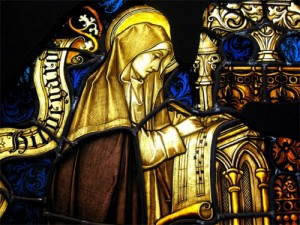 800+Â years later,
800+Â years later,
it still holds up….
now that’s the work of
the Holy Spirit!
Tags: catholic, catholic podcast, catholic prayer, cathollc spirituality, chant, mystic, mystic of the Church, st hildegard of bingen, st. hildegarde, women of the middle ages, work
This entry was posted on Saturday, September 17th, 2011 at 5:00 pm
You can follow any responses to this entry through the RSS 2.0 feed.
Heart of Hope Part 2 – The agony of emotional suffering and opportunities for deeper union with Jesus; the reason for pastoral ministry
[powerpress = “deacon-james-keating”]
Deacon James Keating, PhD, the director of Theological Formation for the Institute for Priestly Formation, located at Creighton University, in Omaha, is making available to â€Discerning Hearts†and all who listen, his series of programs entitled “The Heart of Hopeâ€.
This extraordinarily popular series explores the work of suffering in the Christian life and how God can use it to transform the heart of the individual and the world. 
The “Heart of Hope† tackles a very tough subject…the gift of suffering in the Christian life. Deacon Keating guides us well.
For more information on the “Institute of Priestly Formation†and for other material available by Deacon Keating, just click here
Don’t forget to pickup a copy of “Communion with Christ†, it is one of the best audio sets on prayer…ever!
Check out Deacon Keating’s “Discerning Heart†page
Tags: abandonment, agony, alone, catholic, catholic podcast, catholic prayer, cathollc spirituality, creighton university, Deacon James Keating, Deacon Keating, discerning heart, hearts, institute for priestly formation, isolation, james keating, Jesus, lonliness, parish, PhD, suffering, theological formation
This entry was posted on Thursday, September 15th, 2011 at 3:38 am
You can follow any responses to this entry through the RSS 2.0 feed.
“Standing by the cross of Jesus”
[powerpress=”daily-scripture”]
an excerpt from today’s reflection by Don Schwager:
Does suffering or sorrow weigh you down? The cross brings us face to face with Jesus’ suffering. He was alone. All his disciples had deserted him except for his mother and three women along with John, the beloved disciple. The apostles had fled in fear. But Mary, the mother of Jesus and three other women who loved him were present at the cross. They demonstrate the power of love for overcoming fear (1 John 4:18).
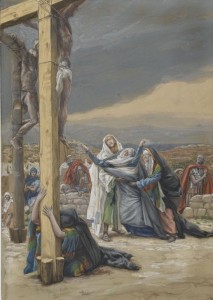 At the beginning of Jesus’ birth, when he was presented in the temple, Simeon had predicted that Mary would suffer greatly – a sword will pierce through your own soul (see Luke 2:33-35). Many have called Mary a martyr in spirit. Bernard of Clairvaux said: Jesus “died in body through a love greater than anyone had known. She died in spirit through a love unlike any other since his.” Mary did not despair in her sorrow and loss, since her faith and hope were sustained by her trust in God and the love she had for her Son. Jesus, in his grief and suffering, did not forget his mother. He entrusted her care to John, as well as John to her. No loss, no suffering can keep us from the love of Christ (Romans 8:35-39). Paul the Apostle says that love bears all things, believes all things, hopes all things, endures all things (1 Corinthians 13:3). We can find no greater proof of God’s love for us than the willing sacrifice of his Son on the cross. Do you know the love that enables you to bear your cross and to endure trial and difficulties with faith and hope in God?
At the beginning of Jesus’ birth, when he was presented in the temple, Simeon had predicted that Mary would suffer greatly – a sword will pierce through your own soul (see Luke 2:33-35). Many have called Mary a martyr in spirit. Bernard of Clairvaux said: Jesus “died in body through a love greater than anyone had known. She died in spirit through a love unlike any other since his.” Mary did not despair in her sorrow and loss, since her faith and hope were sustained by her trust in God and the love she had for her Son. Jesus, in his grief and suffering, did not forget his mother. He entrusted her care to John, as well as John to her. No loss, no suffering can keep us from the love of Christ (Romans 8:35-39). Paul the Apostle says that love bears all things, believes all things, hopes all things, endures all things (1 Corinthians 13:3). We can find no greater proof of God’s love for us than the willing sacrifice of his Son on the cross. Do you know the love that enables you to bear your cross and to endure trial and difficulties with faith and hope in God?
“Lord Jesus Christ, by your death on the cross you have won pardon for us and freedom from the tyranny of sin and death. May I live in the joy and freedom of your victory over sin and death.”
for the full reflection visit : Daily Reading and Meditation
Tags: catholic, catholic podcast, catholic prayer, cathollc spirituality, death, don schwager, gospel of john, Jesus, love, the cross
This entry was posted on Thursday, September 15th, 2011 at 12:01 am
You can follow any responses to this entry through the RSS 2.0 feed.
VATICAN CITY, 14 SEP 2011 (VIS) –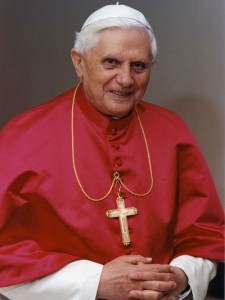
This morning the Holy Father travelled by helicopter from the Apostolic Palace at Castelgandolfo to the Vatican, where he held his weekly general audience in the Paul VI Hall. In his catechesis he dwelt on the first part of Psalm 22, focusing on the theme of prayers of supplication to God.
The Psalm, which remerges in the narrative of Christ’s Passion, presents the figure of an innocent man persecuted and surrounded by adversaries who seek his death. He raises his voice to God “in a doleful lament which, in the certainty of faith, mysteriously gives way to praise”.
The Psalmist’s opening cry of “my God, my God, why have you forsaken me?” is “an appeal addressed to a God Who appears distant, Who does not respond”, said the Holy Father. “God is silent, a silence that rends the Psalmists heart as he continues to cry out incessantly but finds no response”. Nonetheless, he “calls the Lord ‘my’ God, in an extreme act of trust and faith. Despite appearances, the Psalmist cannot believe that his bond with the Lord has been severed entirely”.
The opening lament of Psalm 22 recurs in the Gospels of Matthew and Mark in the cry the dying Jesus makes from the cross. This, Benedict XVI explained, expresses all the desolation the Son of God felt “under the crushing burden of a
mission which had to pass through humiliation and destruction. For this reason He cried out to the Father. … Yet His was not a desperate cry, as the Psalmist’s was”.
Violence dehumanises
Sacred history, the Pope continued, “has been a history of cries for help from the people, and of salvific responses from God”. The Psalmist refers to the faith of his ancestors “who trusted … and were never put to shame”, and he describes his own extreme difficulties in order “to induce the Lord to take pity and intervene, as He always had in the past”.
The Psalmist’s enemies surround him, “they seem invincible, like dangerous ravening beasts. … The images used in the Psalm also serve to underline the fact that when man himself becomes brutal and attacks his fellow man, … he seems to lose all human semblance. Violence always contains some bestial quality, and only the salvific intervention of God can restore man to his humanity”.
At this point, death begins to take hold of the Psalmist. He describes the moment with dramatic images “which we come across again in the narrative of Christ’s Passion: the bodily torment, the unbearable thirst which finds an echo in Jesus’ cry of ‘I am thirsty’, and finally the definitive action of his tormenters who, like the soldiers under the cross, divide among themselves the clothes of the victim, whom they consider to be already dead”.
At this point a new cry emerges, “which rends the heavens because it proclaims a faith, a certainty, that is beyond all doubt. … The Psalm turns into thanksgiving. … The Lord has saved the petitioner and shown him His face of mercy. Death and life came together in an inseparable mystery and life triumphed. … This is the victory of faith, which can transform death into the gift of life, the abyss of suffering into a source of hope”. Thus the Psalm leads us to relive Christ’s Passion and to share the joy of His resurrection.
In closing, the Pope invited the faithful to distinguish deeper reality from outward appearance, even when God is apparently silent. “By placing all our trust and hope in God the Father, we can pray to Him with faith at all moments of anguish, and our cry for help will turn into a hymn of praise”.
AG/ VIS 20110914 (630)
Published by VISarchive 02 – Wednesday, September 14, 2011
Tags: catholic, catholic podcast, catholic prayer, cathollc spirituality, pope benedict xvi, psalm 22
This entry was posted on Wednesday, September 14th, 2011 at 9:34 am
You can follow any responses to this entry through the RSS 2.0 feed.
“When the Lord saw her, he had compassion on her”
[powerpress=”daily-scripture”]
an excerpt from today’s reflection by Don Schwager:
The scriptures make clear that God takes no pleasure in the death of anyone (see Ezekiel 33:11); he desires life, not death. Jesus not only had heart-felt compassion for the widow who lost her only son, he also had extraordinary supernatural power – the ability to restore life and to make whole again. Jesus, however, as an observant Jew incurred grave risk by approaching the bier, since the Jews understood that contact with a dead body made oneself ritually impure. His physical touch, however, not only restored life but brought freedom and wholeness to soul as well as body. This miracle took place near the spot where the prophet Elisha raised another mother’s son back to life again (see 2 Kings 4:18-37). Jesus claimed as his own one whom death had seized as its prey. By his word of power he restored life for a lad marked for death. Jesus is Lord not only of the living but of the dead as well. Jesus triumphed over the grave and he promises that because he lives (and will never die again), we also shall have abundant life with and in him both now and forever (John 14:19). Do you trust in the Lord Jesus to give you abundant life and everlasting hope in the face of life’s trials, misfortunes, and moments of despair?
“Lord Jesus, your presence brings life and restores us to wholeness of mind, body, and spirit. Speak your word to me and give me renewed hope, strength and courage to follow you in all things and to eagerly serve others with a glad and generous heart.”
for the full reflection visit : Daily Reading and Meditation
Tags: catholic, catholic podcast, catholic prayer, cathollc spirituality, don schwager, gospel of luke
This entry was posted on Tuesday, September 13th, 2011 at 8:23 am
You can follow any responses to this entry through the RSS 2.0 feed.
 Ave Maria…the invocation of the name of Mary is a powerful prayer…Ave Maria…every time we say it we cry out to our Mother. What mother doesn’t rush to the aid of her child when he or she cries out her name? Hail Mary. Not just a name, but a supreme gift of grace to us all…the gift of a mother who loves unconditionally, who loves always, who loves each and every one of her children given to her by God.  Hail Mary, when we say it we unlatch the door and allow our mother in, when we say it we pick up the phone and converse with the greatest of human counselors, when we say it we acknowledge the reality of the presence of the “Woman” clothed with the Sun, with the moon under her feet, crowned with the stars who labors to see all of her children “birthed” into heaven. Mary….Mary….Mary.  The Holy Name of….Mary.
Ave Maria…the invocation of the name of Mary is a powerful prayer…Ave Maria…every time we say it we cry out to our Mother. What mother doesn’t rush to the aid of her child when he or she cries out her name? Hail Mary. Not just a name, but a supreme gift of grace to us all…the gift of a mother who loves unconditionally, who loves always, who loves each and every one of her children given to her by God.  Hail Mary, when we say it we unlatch the door and allow our mother in, when we say it we pick up the phone and converse with the greatest of human counselors, when we say it we acknowledge the reality of the presence of the “Woman” clothed with the Sun, with the moon under her feet, crowned with the stars who labors to see all of her children “birthed” into heaven. Mary….Mary….Mary.  The Holy Name of….Mary.
This has become for me a very precious feast day.  Once, when I was traveling on a personal pilgrimage alone, I was feeling achingly isolated, rejected and lost, literally thousands of miles from home. A terrible darkness had shrouded over me emotionally and spiritually. In a very poignant and unexpected way, Our Lady made her presence known to me on this date. It would involve an encounter with a little woman from Africa who looked like my grandmother and spoke no English, and a long plane ride home..this coming together would grow into a gentle, loving exchange  between strangers…I didn’t realize it, but it was what my broken “pierced” heart had been aching for.  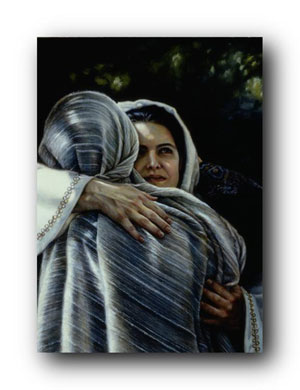 Without fanfare or expectation, out of nowhere came the name of Mary, literally…a moment which illuminated for me the bright light of the Blessed Mother’s presence, and not just at that particular moment in time. Like the brightest star in the night sky, it became clear to me that she had been there truly, truly guiding me all along, even in the darkest moments of doubt and pain.  That she had not, and would never, “leave me alone”.  That I was indeed responding to HER call and in turn she had responded to mine. Mary. It was she who traveled with me on that journey and who would continue to do so in the days and years ahead. Mary.
Without fanfare or expectation, out of nowhere came the name of Mary, literally…a moment which illuminated for me the bright light of the Blessed Mother’s presence, and not just at that particular moment in time. Like the brightest star in the night sky, it became clear to me that she had been there truly, truly guiding me all along, even in the darkest moments of doubt and pain.  That she had not, and would never, “leave me alone”.  That I was indeed responding to HER call and in turn she had responded to mine. Mary. It was she who traveled with me on that journey and who would continue to do so in the days and years ahead. Mary.
Well, the entirety of this story is really for another time, I just wanted to share with those who may read this, that I, unqualified and without hesitation,  with my whole unworthy heart, love Our Blessed Mother…I love “Mary”. I hope and pray you do too. If not, listen today for her name…call out to the one who is waiting…she WILL race to your aid. Mary. She is your mother, a gift to us all from her Son, our Savior, Jesus Christ. A precious, precious gift. Do not toss her aside.  She will never, ever leave you alone.
Father, in the video below, talks about the orgin of this feast day… it’s really quite a lovely homily.
Tags: ave maria, blessed mother, catholic, catholic podcast, catholic prayer, cathollc spirituality, holy name of mary
This entry was posted on Monday, September 12th, 2011 at 7:40 am
You can follow any responses to this entry through the RSS 2.0 feed.
Kate Wicker is OUTSTANDING and her book “Weightless: Making Peace with Your Body”  does so much more than it’s title offers…it reminds us how our faith can help us bring peace into our hearts!!!! I love it!  The blessing of our femininity,  a joy in the gift of the daughter of God we have been created to be, the peace that comes with a prayerful relationship with the Father…these are just  some of the fruits that come from Kate Wicker’s work in “Weightless”.  More than “self-help”, it’s really about letting the saints help, letting your faith help… ultimately, letting God help.  Insights, quotes, guidance, reflections, this book is perfect for individual or group study …check it out!
does so much more than it’s title offers…it reminds us how our faith can help us bring peace into our hearts!!!! I love it!  The blessing of our femininity,  a joy in the gift of the daughter of God we have been created to be, the peace that comes with a prayerful relationship with the Father…these are just  some of the fruits that come from Kate Wicker’s work in “Weightless”.  More than “self-help”, it’s really about letting the saints help, letting your faith help… ultimately, letting God help.  Insights, quotes, guidance, reflections, this book is perfect for individual or group study …check it out!
[powerpress]
What a fun and encouraging interview…it was one of those I just didn’t want to end. Â Take time to listen, then get a copy of the book for yourself and pass other copies to the women in your life.
There’s a wave of body dissatisfaction sweeping across society. While bookstore shelves are well-stocked with tomes on how to overcome body image problems, very few take a faith-based, much less Catholic, approach to self-healing. Weightless: Making Peace With Your Body speaks not only to those who may have faced an eating disorder, but also to anyone who wants to live an abundant life, unencumbered by our culture’s obsession with thinness, physical beauty, youth, or food.
Be sure to visit Kate’s website at katewicker.com
Get a copy of the book here (and get a copy for a friend…they’ll thank you for it!)
Tags: catholic, catholic podcast, catholic prayer, cathollc spirituality
This entry was posted on Monday, September 12th, 2011 at 6:08 am
You can follow any responses to this entry through the RSS 2.0 feed.
“But say the word, and let my servant be healed”
[powerpress=”daily-scripture”]
an excerpt from today’s reflection by Don Schwager:
The centurion who approached Jesus was not only courageous, but faith-filled as well. He risked the ridicule of his Roman companions by seeking help from a Jewish preacher from Galilee, as well as mockery from the Jews who despised Roman occupation of their land. Nonetheless, this centurion approached Jesus with confidence and humility. Augustine notes that the centurion regarded himself as unworthy to receive the Lord into his house: “Humility was the door through which the Lord entered to take full possession of one whom he already possessed.” The centurion was an extraordinary man because he loved his slave. In the Roman world slaves were treated like animals rather than people. The centurion was also an extraordinary man of faith. He believed that Jesus had the power to heal his beloved slave. Jesus commends him for his faith and immediately grants him his request. Are you willing to suffer ridicule in the practice of your faith? And when you need help, do you approach the Lord Jesus with expectant faith?
“Heavenly Father, you sent us your Son Jesus Christ that we might be freed from the tyranny of sin and death. Increase my faith in the power of your saving word and give me freedom to love and serve others with generosity and mercy as you have loved me.”
for the full reflection visit : Daily Reading and Meditation
Tags: catholic, catholic podcast, catholic prayer, cathollc spirituality, don schwager, gospel of luke
This entry was posted on Monday, September 12th, 2011 at 6:03 am
You can follow any responses to this entry through the RSS 2.0 feed.
Non-Negotiable Political Issues for Catholics
[powerpress “faith-check-with-greg-youell”]
What does religion have to do with politics? If we can say that the mission of the Church is the happiness and salvation of all, then the Church will sometimes have to be involved with politics, since the actions of governments can have an impact on people’s happiness and salvation.
By reflecting on the Natural Law and the Gospel, the Church has developed social principles that should guide our societies and governments, including everything from the right to private property and a just wage to how we treat the poor and immigrants.
Of course, Catholics need not be monolithic in how these principles are applied, and there is room for legitimate difference of opinion on many issues.
On the other hand, the Church also teaches that some issues are so fundamental as to be non-negotiable.
In the document Sacramentum Caritatis, Pope Benedict named three specific issues that are paramount to the common good: first, defending human life at all ages and stages; second, upholding traditional marriage between one man and one woman; and, thirdly, protecting the natural right of parents to educate and raise their children according to their beliefs.1
Life, marriage, family—these three form the very foundation of societies, and should be given due priority by Catholics when we go to the ballot box.
1 -Â Sacramentum Caritatis 83 (Post-Synodal Exhortation on the Eucharist)
Tags: catholic, catholic podcast, catholic prayer, cathollc spirituality, voting
This entry was posted on Sunday, September 11th, 2011 at 4:06 am
You can follow any responses to this entry through the RSS 2.0 feed.
.
Prayer of Pope Benedict XVI at Ground Zero
“We ask you, in your compassion to bring healing to those who, because of their presence here that day, suffer from injuries and illness. Heal, too, the pain of still-grieving families and all who lost loved ones in this tragedy. Give them strength to continue their lives with courage and hope.
“We are mindful as well of those who suffered death, injury, and loss on the same day at the Pentagon and in Shanksville, Pennsylvania. Our hearts are one with theirs as our prayer embraces their pain and suffering.
“God of peace, bring your peace to our violent world: peace in the hearts of all men and women and peace among the nations of the Earth. Turn to your way of love those whose hearts and minds are consumed with hatred.
“God of understanding, overwhelmed by the magnitude of this tragedy, we seek your light and guidance as we confront such terrible events. Grant that those whose lives were spared may live so that the lives lost here may not have been lost in vain. Comfort and console us, strengthen us in hope, and give us the wisdom and courage to work tirelessly for a world where true peace and love reign among nations and in the hearts of all.” AMEN
Tags: 9-11, catholic, catholic podcast, catholic prayer, cathollc spirituality, ground zero, pope benedict xvi
This entry was posted on Sunday, September 11th, 2011 at 3:59 am
You can follow any responses to this entry through the RSS 2.0 feed.
EWTN Global Catholic Television Network: EWTN Live – Fr. Mitch Pacwa, SJ – Fr. David J. Simonetti – The Benefits of Spiritual Direction
Fr. Simonetti spoke on the topic of Spiritual Direction on EWTN last night, and spoke for a few minutes about his time with IPF’s Spiritual Direction Training Program
Tags: catholic, catholic podcast, catholic prayer, cathollc spirituality, David J. Simonetti, Global Catholic Television Network, spiritual direction
This entry was posted on Friday, September 9th, 2011 at 5:12 pm
You can follow any responses to this entry through the RSS 2.0 feed.
“Do you not see the log that is in your own eye?”
[powerpress=”daily-scripture”]
an excerpt from today’s reflection by Don Schwager:
If Christ has truly freed us from guilt and condemnation, then why is judgmentalism and a critical spirit so rampant today, even among Christians? “Thinking the best of other people” is necessary if we wish to grow in love. And kindliness in judgment is nothing less that a sacred duty. The Rabbis warned people: “He who judges his neighbor favorably will be judged favorably by God.” How easy it is to misjudge and how difficult it is to be impartial in judgment. Our judgment of others is usually “off the mark” because we can’t see inside the other person, or we don’t have access to all the facts, or we are swayed by instinct and unreasoning reactions to people. It is easier to find fault in others than in oneself. Jesus states a heavenly principle we can stake our lives on: what you give to others (and how you treat others) will return to you (Mark 4:24). The Lord knows our faults and he sees all, even the imperfections and sins of the heart which we cannot recognize in ourselves. Like a gentle father and a skillful doctor he patiently draws us to his seat of mercy and removes the cancer of sin which inhabits our hearts. Do you trust in God’s mercy and grace? Ask the Lord to flood your heart with his loving-kindness and mercy that you may only have room for charity, forbearance, and kindness towards your neighbor.
“O Father, give us the humility which realizes its ignorance, admits its mistakes, recognizes its need, welcomes advice, accepts rebuke. Help us always to praise rather than to criticize, to sympathize rather than to discourage, to build rather than to destroy, and to think of people at their best rather than at their worst. This we ask for thy name’s sake.” (Prayer of William Barclay, 20th century)
for the full reflection visit : Daily Reading and Meditation
Tags: catholic, catholic podcast, catholic prayer, cathollc spirituality, don schwager, gospel of luke
This entry was posted on Friday, September 9th, 2011 at 11:47 am
You can follow any responses to this entry through the RSS 2.0 feed.

